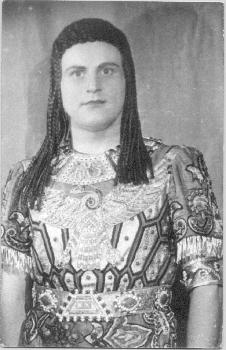Marian Porębski
17 July 1910 Sosnowiec – 24 July 2008 Bilcza
In RA format
In RA format
He studied voice in his home town and eventually in the studio of the Teatr Wielki in Warsaw. He had not yet finished his studies
when the Nazis attacked Poland in 1939; Porębski joined the Polish army as a volunteer, and after their quick defeat went to
France, where he continued to be a soldier in the Polish exile army. When the Nazis took also France, he stayed, and became part of
the French Resistance as "Mario Crépin", and helped to smuggle Poles and Jews to the United Kingdom. Nonetheless, he also
continued to work on his voice in Toulouse.
In January 1944, he made his debut at the Grand Théâtre in Bordeaux, as Vasco da Gama, followed by Cavaradossi at the
Capitole in Toulouse. After the war, he tried going back to Poland, but it was a failure: his wife had got the official but wrong
information that he had died, and had married someone else, and Porębski didn't find traction.
So he was soon back to France, and spent his entire 25-year career in the
French speaking countries. Lille and Marseille were the centers of his activity, but he also sang in Toulouse, Algiers, at the Paris
Opéra-Comique, in Liège, Gent, Orange, Aix-en-Provence, at the Monnaie in Brussels, in Lyon, Nîmes, Montpellier,
as well as in Switzerland and, even though just for a handful of performances, in Poland (Bytom, Wrocław).
Other than a singer, he was also a sought-after voice teacher, and after his solo career had his own vocal ensemble. He married one
of his pupils, Daniela Porębski-Quasnik, who was a soprano in his ensemble and became a professor of music at the Sorboone
University in Paris.
In 1990, after 50 years in France, Porębski moved back to Poland with his wife (a Belgian-born daughter of Polish emigrants).
He sang primarily the dramatic repertory: Siegmund, both Siegfrieds, Tristan, Sigurd, Jean (Hérodiade), Manrico, Radamès,
Éléazar, Samson, Otello, but also Mylio, Rodolfo, Werther, Shahabarim (Salammbô), Adoniram (La reine de Saba by
Gounod)... One of his biggest successes was the role of Christ in Albert Dupuis' opera La passion, which he sang in Lille in
1951.
Reference 1, reference 2, reference
3, reference 4
I wish to thank Georges Cardol for the recording (Halka) and the picture.
|
